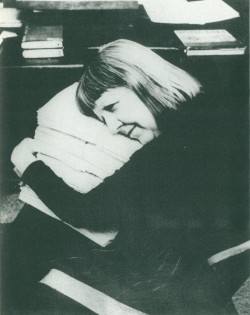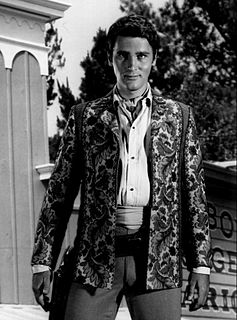A Quote by Douglas Adams
And then, one Thursday, nearly two thousand years after one man had been nailed to a tree for saying how great it would be to be nice to people for a change, a girl sitting on her own in a small café in Rickmansworth suddenly realized what it was that had been going wrong all this time, and she finally knew how the world could be made a good and happy place. This time it was right, it would work, and no one would have to get nailed to anything.
Quote Topics
After
Anything
Be Nice
Be Nice To People
Been
Change
Could
Finally
Get
Girl
Going
Good
Great
Had
Happy
Happy Place
Her
How
Knew
Made
Man
Nailed
Nearly
Nice
One Man
Own
People
Place
Realized
Right
Saying
She
Sitting
Small
Suddenly
Then
Thousand
Thousand Years
Thursday
Time
Tree
Two
Work
World
Would
Would Be
Wrong
Years
Related Quotes
The girl had a certain nobleness of imagination, which rendered her a good many services and played her a great many tricks. She spent half her time in thinking of beauty, bravery, magnanimity; she had a fixed determination to regard the world as a place of brightness, of free expansion, of irresistible action, she thought it would be detestable to be afraid or ashamed. She had an infinite hope that she would never do anything wrong. She had resented so strongly, after discovering them, her mere errors of feeling.
Hats change everything. September knew this with all her being, deep in the place where she knew her own name, and that her mother would still love her even though she hadn’t waved goodbye. For one day her father had put on a hat with golden things on it and suddenly he hadn’t been her father anymore, he had been a soldier, and he had left. Hats have power. Hats can change you into someone else.
I went over to see Marina two or three or four times a week. I knew as long as I could see the girl I would be all right…. Soon after, I got a letter from Fay. She and the child were living in a hippie commune in New Mexico. It was a nice place, she said. Marina would be able to breathe there. She enclosed a little drawing the girl had made for me.
She wondered how people would remember her. She had not made enough to spread her wealth around like Carnegie, to erase any sins that had attached to her name, she had failed, she had not reached the golden bough. The liberals would cheer her death. They would light marijuana cigarettes and drive to their sushi restaurants and eat fresh food that had traveled eight thousand miles. They would spend all of supper complaining about people like her, and when they got home their houses would be cold and they'd press a button on a wall to get warm. The whole time complaining about big oil.
She would have liked to know how he felt as to a meeting. Perhaps indifferent, if indifference could exist under such circumstances. He must be either indifferent or unwilling. Has he wished ever to see her again, he need not have waited till this time; he would have done what she could not but believe that in his place she should have done long ago, when events had been early giving him the indepencence which alone had been wanting.
If in the 1930s nuclear weapons had been invented and the Allies had been faced by Nazi SS20s and Backfire Bombers, would it then have been morally right to have handed Hitler control of one of the most terrible weapons man has ever made? Would not that have been the one way to ensure that the thousand year Reich became exactly that? Would not unilateralism have given to Hitler the world domination he sought?
Lastly, she pictured to herself how this same little sister of hers would, in the after-time, be herself a grown woman; and how she would keep, through all her riper years, the simple and loving heart of her childhood: and how she would gather about her other little children, and make their eyes bright and eager with many a strange tale, perhaps even with the dream of Wonderland of long ago: and how she would feel with all their simple sorrows, and find a pleasure in all their simple joys, remembering her own child-life, and the happy summer days.
As a child, Kate hat once asked her mother how she would know she was in love. Her mother had said she would know she was in love when she would be willing to give up chocolate forever to be with that person for even an hour. Kate, a dedicated and hopeless chocoholic, had decided right then that she would never fall in love. She had been sure that no male was worth such privation.
Somehow, she had grown into a woman in between the fall of kings and collapse of worlds. Once she had been terrified of change. Then she had been terrified of losing Elend. Now her fears were more nebulous - worries of what would come after she was gone, worries of what would happen to the people of the empire if she failed.
I think back to the day I drove Michelle and a newborn Malia home from the hospital nearly 11 years ago - crawling along, miles under the speed limit, feeling the weight of my daughter's future resting in my hands. I think about the pledge I made to her that day: that I would give her what I never had - that if I could be anything in life, I would be a good father. I knew that day that my own life wouldn't count for much unless she had every opportunity in hers.
She emptied herself of Fabio and of herself, of all the useless efforts she had made to get where she was and find nothing there. With detached curiosity she observed the rebirth of her weaknesses, her obsessions. This time she would let them decide, since she hadn't been able to do anything anyway. Against certain parts of yourself you remain powerless, she said to herself, as she regressed pleasurably to the time when she was a girl.
It wasn't an architect who did this, but if it had been an architect, it would have been a good day's work: there was a marketing person who convinced Walmart that their products sold better in daylight than electric light. It would have been interesting if an architect had deliberately designed this change with all its spatial consequences in mind, thinking about how the change would multiply across all the square footage of all the roofs of all the Walmarts in the world. It would have been a beautiful trick - a physical, practical, political pleasure.
Audrey, it seems to me, never strove or hoped to leave a lasting legacy with her films - she was far too modest for that. But what I think she would have wanted, had she been given more time, would have been to continue her work for children because she knew that is a task with so much to be accomplished.





































